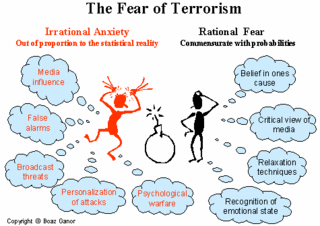Det tål att tänka på när medierna jobbar för högtryck med att skrämma upp allmänheten....
The terrorists’ primary aim is to create fear within the target population, with the intention that this fear is translated into pressure on the government to accede to the terrorists’ demands in order to stave off further terror attacks. The success of this strategy is dependent on the degree to which the fear of attack can be magnified out of all proportion to the actual danger.
The fear engendered in a population living in the shadow of terrorism has two components—a rational component and an irrational component.
The rational fear is simply a product of the possibility of meeting a violent death as a result of a terror attack, with the degree of anxiety being proportional to the actual likelihood of the event occurring. In a society experiencing a large number of attacks, such anxiety is natural.

However, there is also a more insidious element—an “irrational” anxiety—a fear that bears no relation to the actual statistical probability of ones being killed or injured in a terror attack, or even of a terror attack taking place at all.
It is this irrational anxiety that is the interim goal of the terrorist organization, and the means by which it exerts pressure on the target population. By magnifying the threat—making it seem that violent death lies around every corner—the terrorists hope to amplify the victim’s anxiety to the point where he looses a sense of proportion.
Terrorism is psychological warfare pure and simple. It aims to isolate the individual from the group, to break up a society into so many frightened individuals, hiding in their homes and unable to go about their daily lives as citizens, employees, and family members. Further the terrorist aims to undermine the individual’s belief in the collective values of his society, by amplifying the potential threat to the extent that security appears to outweigh all other political concerns. Terrorism uses the victim’s own imagination against him.




